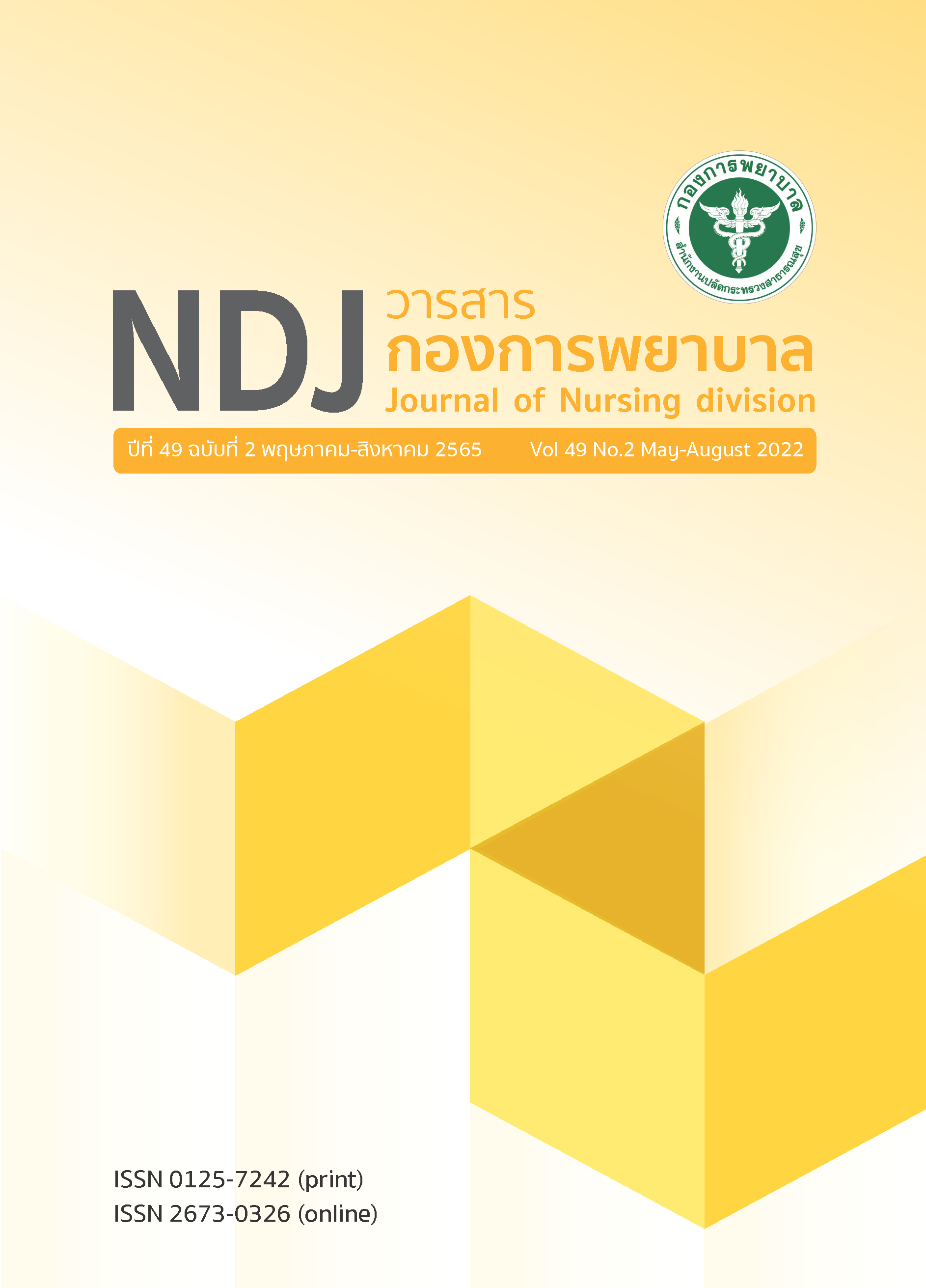ผลของโปรแกรมส่งเสริมสุขภาพต่อการปรับเปลี่ยนพฤติกรรมการรับประทานอาหารและการออกกำลังกายในเด็กที่มีภาวะอ้วน โรงพยาบาลสมเด็จพระยุพราชด่านซ้าย
Main Article Content
บทคัดย่อ
เด็กที่มีภาวะอ้วน มีความเสี่ยงต่อการเกิดโรคเรื้อรัง ความผิดปกติทางเมตาบอลิซึม ผลกระทบทางจิตใจและสังคม การปรับเปลี่ยนพฤติกรรมการรับประทานอาหารและการออกกำลังกายจึงมีความสำคัญ การวิจัยกึ่งทดลองแบบหนึ่งกลุ่มวัดผลก่อนและหลังการทดลองนี้ มีวัตถุประสงค์ เพื่อศึกษาผลของโปรแกรมส่งเสริมสุขภาพต่อการปรับเปลี่ยนพฤติกรรมการรับประทานอาหารและการออกกำลังกายในเด็กที่มีภาวะอ้วน โรงพยาบาลสมเด็จพระยุพราชด่านซ้าย กลุ่มตัวอย่าง คือ เด็กที่มีภาวะอ้วน อายุ 9-12 ปี คัดเลือกแบบเจาะจง จำนวน 26 คน ได้รับโปรแกรมส่งเสริมสุขภาพที่ประยุกต์ทฤษฎีพฤติกรรมตามแผน โดยจัดกิจกรรมในคลินิกโภชนาการเด็ก 4 ครั้ง และโทรศัพท์ติดตามเยี่ยม 3 ครั้ง เครื่องมือเก็บรวบรวมข้อมูล ได้แก่ ข้อมูลส่วนบุคคลและภาวะโภชนาการ พฤติกรรมการรับประทานอาหาร การออกกำลังกาย และน้ำหนักตามเกณฑ์ส่วนสูง ค่าความตรงตามเนื้อหา 0.93 ค่าความเที่ยง 0.80 วิเคราะห์ข้อมูลด้วยความถี่ ร้อยละ ค่าเฉลี่ย ส่วนเบี่ยงเบนมาตรฐาน และสถิติ Paired t test
ผลการวิจัย พบว่า ภายหลังการทดลอง กลุ่มตัวอย่างมีคะแนนเฉลี่ยพฤติกรรมการรับประทานอาหารและการออกกำลังกาย สูงกว่าก่อนการทดลองอย่างมีนัยสำคัญทางสถิติ (p < .001) ค่าเฉลี่ยน้ำหนัก และค่าเฉลี่ยร้อยละของน้ำหนักตามเกณฑ์ส่วนสูง ต่ำกว่าก่อนการทดลองอย่างมีนัยสำคัญทางสถิติ (p < .001) โปรแกรมส่งเสริมสุขภาพที่พัฒนานี้มีประสิทธิผลทำให้เด็กที่มีภาวะอ้วนเกิดการเปลี่ยนแปลงพฤติกรรมและสามารถลดน้ำหนักได้
Article Details

อนุญาตภายใต้เงื่อนไข Creative Commons Attribution-NonCommercial-NoDerivatives 4.0 International License.
เอกสารอ้างอิง
WHO. Obesity: preventing and managing the global epidemic in Report of a WHO consultation. World Health Organ Tech Rep Ser: 2000. 894 i-xii, 1-253.
The GBD 2015 Obesity Collaborators. Health Effects of Overweight and Obesity in 195 Countries Over 25 Years. The New England Journal of Medicin. 2017; 38: 446-58.
Wichai Ekplakorn. (Ed.). Report of the 5th Thai National Health Examination Survey 2014. Nonthaburi:Institute of Health Systems Research: 2014. Thai. Janssen I, LeBlanc A. Systematic review of the health benefits of physical activity and fitness in schoolaged children and youth. International Journal of Behavioral Nutrition and Physical Activity. 2010; 7(40): 1-16.
Weerasak Chonchaiya, Chanthita Pruksananon. Obesity. In Tippawan Hansakunachai et al., (Editor). Child Development and Behavior Textbook for general practice.Nonthaburi: Beyond Enterprise; 2011.Thai.
Gettys FK, Jackson JB, Frick SL. Obesity in pediatric orthopaedics. Orthop Clin North Am. 2011; 42: 95-105.
Pulwit Thongtang, Chanjira Seesawang. Overweight in Thai children. Rama Nurs J. 2013; 18(3): 287-97. Thai
Puder JJ, Munsch S. Psychological correlates of childhood obesity. Int J Obes (Lond). 2013; 34 Suppl 2: S37-43.
Verstraeten R, Roberfroid D, Lachat C, Leroy J L et al. Effectiveness of preventive school-based obesity interventions in low-and middle-income countries: A systematic review. American Journal of Clinical Nutrition; 2012: 96, 415-38.
Children's Nutrition Club of Thailand Royal College of Pediatricians of Thailand. (2014). Guidelines for the prevention and treatment of obesity in children; 2014: Bangkok. Thai.
Bureau of Nutrition, Department of Health. Guidelines for controlling obesity in school children. Nonthaburi: Office of the War Veterans Organization: 2014. Bangkok. Thai.
Oude LH, Baur L, Jansen H, Shrewsbury VA. Interventions for treating obesity in children. Cochrane Database Syst Rev. 2009; CD001872.
Yaemmen P. The Effects of Health Promotion Program by Application of Health Belief Model and Social Support on Behavioral Modification for Weight Control among Overweight Students at Level 5 of Primary School, Muang District, Phitsanulok Province. [Thesis]. Khon Kaen: Khon Kaen university; 2011.
Kattariya Seangsiripong. The Social Support to Weight Control Among Obese Children in Primary School in Muang district, Yasothon Province. [Thesis]. Mahasarakham: Mahasarakham university; 2012. Thai.
Thanyalakwadee Konthongtom, Apawan Nookong, Pannarat Sangperm. Effects of Weight Control Program on Eating and Physical Activity Behaviors Among School-Aged Children with Overweight. Journal of Nursing Science Chulalongkorn University. 2018; 30(2): 28-40. Thai.
Onanong Chukaew. Effects of dietary and physical activity behaviors promotion program for overweight student in bangkok metroepolitan school. [Thesis]. Bangkok: Mahidol university; 2013. Thai.
Siega-Riz AM, Ghormli LE, Mobley C, et al. The effects of the HEALTHY study intervention on middle school student dietary intakes. International Journal of Behavioral Nutrition and Physical Activity. 2011; 8: 1-8.
Alfaleh G, Huffan HG, Li T, Vaccaro JA. Child Obesity Prevention Intervention in Kuwaiti Summer Camps Targeting Health Behaviors in Nutrition, Physical Activity, and Screen Time. J Health Sci Med Res. 2020; 39(2): 85-99.
Onanong Chukaew. Effects of nutritional self-management program on food consumption behaviors and body weight of obese upper primary school children. [Thesis]. Songkla: Songklanagarind university; 2015. Thai.
Ajzen, I. The theory of planned behavior. Organization Behavior and Human Decision Processes. 2002; 50(2): 179-211.
Patcharee Duangchan. Effectiveness of Behavioral Intervention Program Applying Self-control and Self-efficacy for Modifying Psychological, Behavioral, and Physical Variables among Schoolchildren at risk of Type 2 Diabetes. [Thesis]. Bangkok: Ramkhamhaeng University; 2010. Thai.
Arnon Kongsoontornkitkul. Effect of using diet and exercise program base on theory reasoned action to prevent obesity of overweight elementary school students. [Thesis]. Bangkok: Chulalongkorn university; 2014. Thai.
Mollerup PM, Gamborg M, Trier C, et al. A hospital based child and adolescent overweight and obesity treatment protocol transferred into a community healthcare setting. PLoS ONE. 2017;12(3): e0173033
Corbin CB, Lindsey R, Greg Welk G, (eds). Nutrition. In: Concepts of fitness and wellness. 3rd ed. Boston;Mc Graw Hill: 2000.


